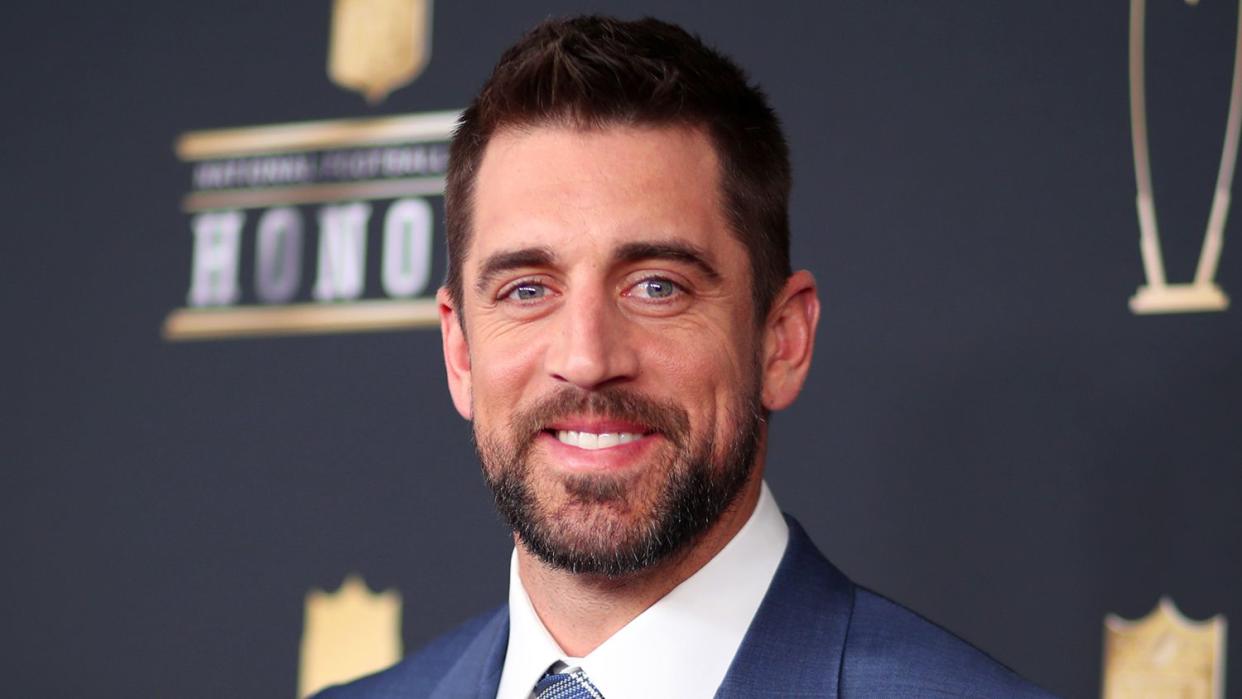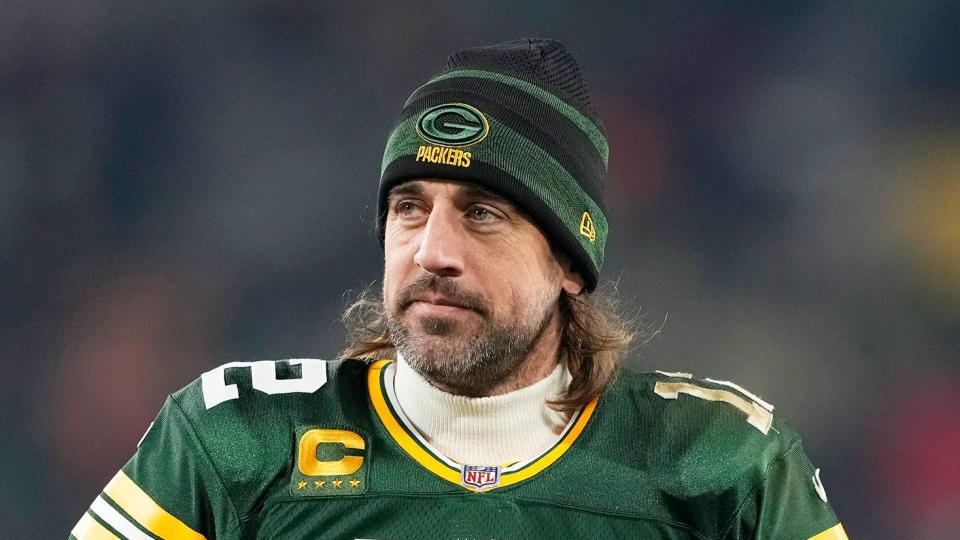Aaron Rodgers Defends Ayahuasca, Says He May Be 'Called' to Take the Psychedelic Again

- Oops!Something went wrong.Please try again later.
- Oops!Something went wrong.Please try again later.
Christopher Polk/Getty
Aaron Rodgers is not finished with his ayahuasca journey.
The Green Bay Packers quarterback, 38, made an appearance on The Pat McAfee Show Tuesday, where he addressed his team's psychedelic-inspired end zone celebration at their Monday game against the Chicago Bears.
After Rodger's teammate Allen Lazard ran the ball in for a touchdown, the wide receiver used his football as a stand-in for a pitcher and mimed pouring a drink into his teammates' hands. They feigned taking sips, then had intense, ayahuasca-like reactions from trembling to falling to the ground.
Eagle-eyed fans identified the connection between the celebratory moment and their quarterback's off-season preference for doing ayahuasca.
The former Super Bowl champion addressed the celebration on the web-based sports talk show afterward, saying he and Lazard had talked about doing a specific, memorable celebration with the team and once he saw what they were up to ran over because he "just wanted to get involved."
Best celebration of season. Thank you Twitter for pointing out it’s Ayahuasca pic.twitter.com/KPna2bMLoM
— Andrew Perloff (@andrewperloff) September 19, 2022
However, Rodgers also said he wanted to be sure he wasn't "sending the wrong message" about ayahuasca.
"You're not standing up drinking, having this Jesus revival, slaying in the spirit. It's not like that," he clarified. "You don't have some immediate pass out into oblivion."
When McAfee referred to the substance as a drug, Rodgers stopped him, saying he found the word "manipulative." He said calling it a drug added to biases.
"Ayahuasca is not a drug," Rodgers said. "It has properties in it that have hallucinogenic abilities. But it's not a drug. We're talking about plants here.
RELATED: Aaron Rodgers Says Ayahuasca Experience Didn't Help Him Heal His Fractured Family Relationships
"It's a very important point to make," he continued. "This is how words are created in society to create a certain bias against certain things. I do think it's important to go on this ridiculous tangent how words are used to create bias. Those biases create fears and those fears prevent people from doing their own research or having their own idea and truth in a situation."
He said if he is "called" to take ayahuasca again, he would.
"I don't think that was the last time," Rodgers said.
The Packers' four-time MVP quarterback later said it is "an intuitive feeling" for someone to know when it's time to "sit with the medicine again."
"Once you sat with the medicine one time you kind of know what that feeling is that more lessons to be learned. ... Some people sit 100 straight days and still feel called years and years down the road to keep on doing it. I had such a beautiful experience I'm pretty certain it won't be my last."
RELATED: Aaron Rodgers Admits He Misled Media with 'Immunized' Remark, Addresses Fall Out
Rodgers has opened up in the past about how his use of psychedelic drugs helped his personal mental health journey.
During an interview on the Aubrey Marcus Podcast, Rodgers said ayahuasca helped him "unconditionally love" others.
"To me, one of the core tenets of your mental health is that self-love," Rodgers told host Aubrey Marcus, who also founded the supplement company, Onnit. "That's what ayahuasca did for me, was help me see how to unconditionally love myself."
"It's only in that unconditional self-love, that then I'm able to truly be able to unconditionally love others," he added. "And what better way to work on my mental health than to have an experience like that?"
He said the effect of the drug also helped his relationship with the Packers.
"The greatest gift I can give my teammates, in my opinion, is to be able to show up and to be someone who can model unconditional love to them," he explained. "I mean obviously it's important I play well, and show up and lead and all that stuff. They won't care about what you say until they know how much you care."

Patrick McDermott/Getty Aaron Rodgers discusses thoughts on retirement
Never miss a story — sign up for PEOPLE's free daily newsletter to stay up to date on the best of what PEOPLE has to offer, from juicy celebrity news to compelling human interest stories.
According to the Alcohol and Drug Foundation, ayahuasca is drunk as a liquid and can affect a person's thinking, sense of time, and emotions. Ayahuasca contains the active ingredient N,N-Dimethyltryptamine (DMT), which is a banned Schedule I drug, according to Double Blind.
While Rodgers said he didn't recommend ayahuasca to others, he said it had a profound impact on his life. The substance has been used for centuries, for religious and medicinal purposes in South American countries like Peru — where Rodgers said he first tried ayahuasca in 2020.
In February, Rodgers was named the Most Valuable Player for the 2021-2022 NFL Season. It was the second time in two seasons that he won the honor.
Rodgers was also a point of controversy after he revealed he did not receive a COVID-19 vaccination after previously telling reporters he was "immunized."
After his admission, Rodgers was fined for violating the league's COVID protocols, including not wearing a mask during his news conferences and going maskless in the team's facility.

